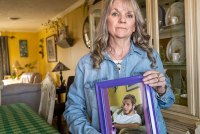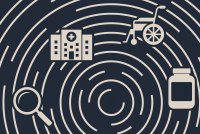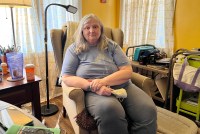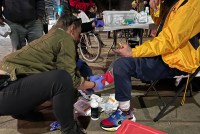Latest KFF Health News Stories
A Rural County’s Choice: Use Opioid Funds to Pay Off Debt, or Pay Them Forward to Curb Crisis
Greene County, Tennessee, so far has received more than $2.7 million from regional and national settlements with opioid manufacturers and distributors. But most of the money is not going to help people and families harmed by addiction.
Listen: How Are States Spending Money From the Opioid Settlements? It’s Not Easy to Know
KFF Health News senior correspondent Aneri Pattani appeared on NPR’s “1A” on May 1 to discuss issues related to how opioid settlement funds are being distributed.
Journalists Discuss Enduring Effects of Long Covid and Handling of Opioid Settlement Funds
KFF Health News and California Healthline staff made the rounds on national and local media this week to discuss their stories. Here’s a collection of their appearances.
The Biden Administration Vowed to Be a Leading Voice on Opioid Settlements But Has Gone Quiet
Billions of dollars are headed to state and local governments to address the opioid crisis. Policy experts and advocates expect the federal government to play a role in overseeing the use of the money. Failure to do so, they say, could lead to wasted opportunities. And, since Medicaid helps pay health care costs, the feds could have a claim to portions of states’ opioid settlements.
Journalists Track Opioid Settlement Cash and Fees for Telehealth Visits
KFF Health News and California Healthline staff made the rounds on national and local media this week to discuss their stories. Here’s a collection of their appearances.
Dentro de una de las pocas escuelas secundarias para adolescentes con adicciones
Hay 43 en todo el país y están diseñadas para estudiantes que se están recuperando de una adicción, y que también podrían estar lidiando con trastornos de salud mental relacionados.
‘Hard to Get Sober Young’: Inside One of the Country’s Few Recovery High Schools
A few dozen high schools across the U.S. combine education with recovery treatment for substance use disorders to keep kids sober and in school.
Readers and Tweeters Are Horrified by Harm Tied to Dental Device
KHN gives readers a chance to comment on a recent batch of stories.
Localize This: Public Reporting of Opioid Settlement Cash
KFF Health News’ recent investigation offers a great opportunity for reporters to investigate an important issue of government accountability from a state or local angle.
Se pagarán $50,000 millones como liquidación del acuerdo sobre opioides. Veremos cómo se gastan
La mayoría de los acuerdos estipulan que los estados deben gastar al menos el 85% del dinero que recibirán, en los próximos 15 años, en el tratamiento y la prevención de adicciones.
$50 Billion in Opioid Settlement Cash Is on the Way. We’re Tracking How It’s Spent.
Spending the money effectively and equitably is a tall order for state and local governments, and a lack of transparency in the process is already leading to fears of misuse.
End of Covid Emergency Will Usher in Changes Across the US Health System
The May 11 expiration of the federal government’s pandemic emergency declaration will affect patient care across a broad range of settings, including telemedicine, hospitals, and nursing homes.
¿Ayudan las nuevas guías sobre opioides a los pacientes con dolor crónico?
Las recomendaciones dejaron a muchos pacientes lidiando con las consecuencias para la salud mental y física de la reducción rápida de la dosis o la suspensión abrupta de los medicamentos que habían estado tomando durante años, lo que conlleva riesgos de abstinencia, depresión e incluso suicidio.
New CDC Opioid Guidelines: Too Little, Too Late for Chronic Pain Patients?
In November, the Centers for Disease Control and Prevention released new guidelines for prescribing opioids for pain, allowing physicians more flexibility. But doctors, patients, and advocates wonder if the updated standards will be too little, too late to help chronic pain patients in a country still focused on fighting the ongoing opioid crisis.
Envíos ilegales de medicamentos por correo no son de opioides. Muchos contienen Viagra genérico
Los funcionarios de la FDA afirman que los medicamentos comprados en farmacias extranjeras tienen 10 veces más probabilidades de ser falsificados que los vendidos en Estados Unidos.
Despite Pharma Claims, Illicit Drug Shipments to US Aren’t Full of Opioids. It’s Generic Viagra.
The FDA has long blocked the importation of cheap medicine, agreeing with pharmaceutical manufacturers that it opens the door to opioids. The agency’s own data shows that rarely happens.
Venden opioides mezclados con tranquizilantes para animales en vecindario de Philadelphia
Los traficantes utilizan xilacina, un sedante barato no autorizado, para cortar el fentanilo, un opioide sintético 50 veces más potente que la heroína. El nombre callejero de la xilacina es “tranq”, y el fentanilo cortado con xilacina se llama “tranq dope”.
As Opioids Mixed With Animal Tranquilizers Arrive in Kensington, So Do Alarming Health Challenges
The veterinary tranquilizer xylazine, the choice du jour of local drug dealers to cut fentanyl, leads to necrotic ulcers and leaves street medics and physicians confused about how best to deal with this wave of the opioid crisis.
Montana Lawmakers Seek More Information About Governor’s HEART Fund
Republican Gov. Greg Gianforte’s Healing and Ending Addiction Through Recovery and Treatment fund has spent $5.2 million since 2021. With a proposed increase, providers and lawmakers alike want to tap into the money.
Some Addiction Treatment Centers Turn Big Profits by Scaling Back Care
Private equity groups are cashing in on rising rates of alcohol and drug addiction in the U.S. But they aren’t necessarily investing in centers with the best treatment standards, and they often cut extra services.





















